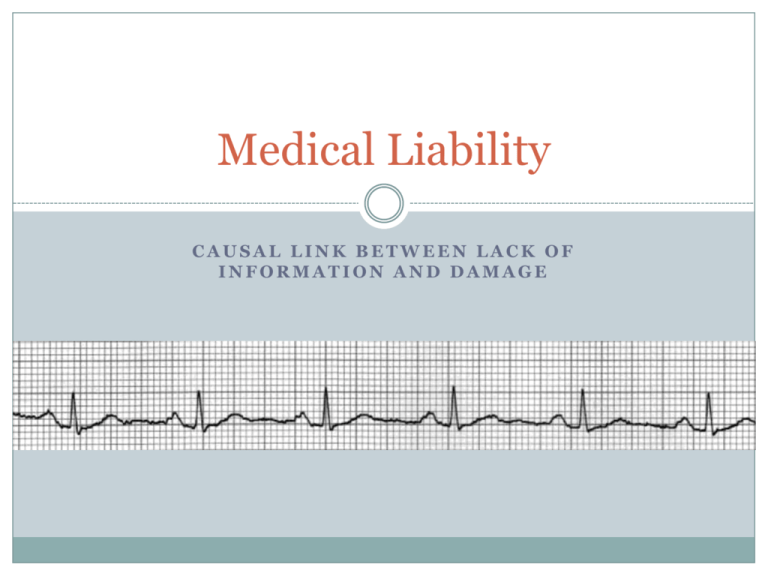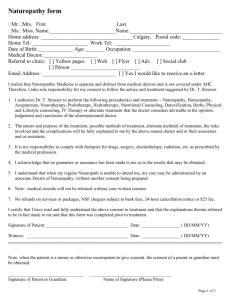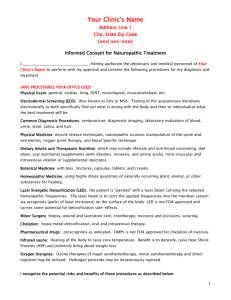Medical Liability
advertisement

Medical Liability CAUSAL LINK BETWEEN LACK OF INFORMATION AND DAMAGE Is it possible to establish a causal link between lack of information or defective clarification and damage caused to the patient, and therefore obliging the doctor to a duty of compensation? When dealing with medical liability, the answer to this question has always been difficult for the doctrine, as well as for the Courts to find. The reason for this difficulty is based on the fact that medical actions take place in peculiar situations, and therefore give rise to unpredictable consequences. Nevertheless, 4 different resolution methods can be identified to answer this question. Common Law French Law German Law Portuguese Law Common Law In relation to medical liability, there are two typified crimes: Battery Negligence Tort of battery Tort of battery consists on intentionally violating someone’s physical integrity, without just cause. In medicine, this happens when no consent was given before the intervention or when the doctor overcomes the limits of consent. Negligence An action based on negligence is adequate when the patient gave his consent but due to inadequate clarification, the consent was “poisoned”. In this case, the patient has to prove that the information revealed was inferior to what was required by law + show that he wouldn’t authorize the treatment if he knew about the risks. In the USA, the causal link between damages and lack of information is only established when proven that the information would lead to refusing the intervention. An analysis to Canadian jurisprudence shows that in Canada, 56% of the cases, the patient wasn’t able to overcome the causality test, despite the proof of the doctor’s breach of duty. French Law According to French and Belgian Law, it is possible to claim a compensation from the loss of opportunity in obtaining a better medical treatment. (Dano da perda da chance) In this case, the patient has to prove that the opportunity was strong enough, and due to the lack of information, he lost the chance to chose an alternative treatment which would have not caused him damages. The Cour de Cassation (case Hedreul), admitted that if it shown, with all the probability, that the noninformed patient would have authorized the intervention, there will be no medical liability. German Law (resembled to the Portuguese) According to the German Law, if the patient isn’t duly informed, the consent is ineffective. This being, an arbitrary intervention is always an adequate cause of damage. In case of insufficient information, the medical intervention is illicit, and the doctor is responsible for the damages. Nevertheless, it is necessary to establish a causal link between the omission of the duty to inform and the damage. This being, the Courts demand that there is an adequacy between the medical intervention and the health damages. In this case, the cause of the damage is based on an omission (of informing) and not an action. A figure called “hypothetic consent” appeared, constituting a case of “licit alternative behavior”. When claiming “licit alternative behavior” the doctor arguments that in case of violation of informed consent, even if the patient knew all the information, he would have consented on the intervention anyhow. German jurisprudence accepts this figure as a way of rejecting abusive actions when the patient argues with lack of information, or incomplete information. The BGH (Supreme Federal Court), allows the “hypothetic consent” figure. The patient has not only to allege that if he had been informed he would have refused the intervention, but he has also to show that he would have been facing a conflict decision, having difficulty do choose between interventions. Upon the doctor impends the burden of proof that the patient would have consented on the intervention, even though the doctor had acted legally. The “hypothetic consent” shall be analyzed according to the “specific patient” and not according to the “reasonable patient”, meaning that the personal decision is taken in consideration. Part of the doctrine is against this figure, believing it is a way of taking responsibility away from the doctors. Hypothetical consent – Portuguese law The modern Portuguese doctrine accepts that the doctor can defend himself claiming the exception of licit alternative behavior. Nevertheless, this mechanism can only work in these cases: 1 - It can never be admitted when in case of serious breach of the doctor’s conduct duties: - doctor’s degree of guilt violation of essential procedural requirements when there is no consent at all omission of fundamental information 2 – In case of light breaches of the duty to provide information, this defense mechanism shall be admitted 3 – The burden of proof shall be claimed by the doctor (aquele que se pretende fazer valer de um facto impeditivo do direito). In this case there is an inversion of the burden of proof. 4 – In case of doubt whether if the patient would accept the medical intervention, the Portuguese judge can lessen the doctor’s liability, considering the degree of guilt. Conclusion All European countries protect the patient’s autonomy and right to informed consent. In the majority of European countries, the burden of proof of revealing the information is up to the doctor. In case of arbitrary interventions, the doctor is, in principle, liable, having to pay a compensation for all damages, including pecuniary and non-pecuniary. Conclusion Anyhow, in case of non-fundamental information breach, many legal systems reduce or even eliminate the patient’s compensation. Mock Case A patient swallowed a nail, and therefore had to be submitted to an intervention. On the following days, the patient remained on the hospital, and was surprised by the amount of laxatives that were being administrated. Eventually the nail was excreted by natural ways. The patient concluded that he had been submitted to an unnecessary intervention, and sued both the doctor and the hospital. It was concluded that the surgery was absolutely necessary due to bowel perforation, however the doctor was condemned for not informing the patient of that circumstance, and for not informing that the nail wasn’t removed during the surgery. The patient argued that he wasn’t duly informed and the rapporteur (relator do acórdão) concluded that in the doctor-patient relationship, the duty of information has to be considered. This right derives from the principle of human dignity and private autonomy. Although the doctor acted technically correct (on the medical point of view), his conduct concerning the duty to inform was illicit. Faculdade de Direito da Universidade Nova de Direito Direito da Saúde e Bioética Matilde Álvares Ribeiro 003459







